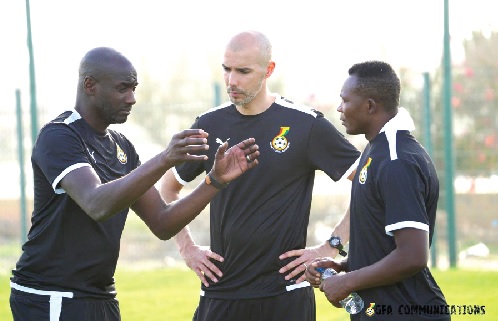Black Stars Head Coach, Otto Addo, stands on the brink of a potential lifeline, as the Ghana Football Association (GFA) Executive Council failed to reach a decisive verdict on his future during a crucial review meeting last Wednesday.
The 47-year-old tactician faces mounting criticism following Ghana’s disastrous campaign in the 2025 Africa Cup of Nations (AFCON) qualifiers, which ended with the team finishing last in a group featuring Niger, Angola and Sudan—without securing a single victory in six matches – and failing to qualify for Africa’s flagship competition for the first time since 2004.
He now faces a divided GFA, public discontent, and the monumental task of rebuilding the nation’s faith in its beloved team.
Divided house
Public opinion has turned sharply against the coach, with many calling for his dismissal alongside his underwhelming backroom staff. Yet, the GFA ExCo appears split on the matter.
Some members are firmly against retaining the coach, citing his failure to meet key performance indicators (KPIs) and poor team management. Critics argue that his decisions regarding team leadership sowed discontent among senior players, further eroding morale.
On the other hand, a more measured group within the council insists the team’s decline runs deeper than coaching inadequacies and reflects systemic issues within Ghanaian football. Since 2019, five coaches—Kwasi Appiah, Charles Akonnor, Milovan Rajevac, Chris Hughton, and now Addo—have taken the helm, only for the Black Stars’ fortunes to continue their downward spiral.
This broader decline, they claim, reflects systemic issues within the GFA’s leadership rather than the shortcomings of one individual.
During last Wednesday’s meeting, the coach reportedly shouldered responsibility for the team’s poor performance and identified areas requiring improvement in a 56-page report presented to the ExCo. He expressed his commitment to building a stronger team and requested the reinforcement of his technical staff to address glaring deficiencies.
Despite his appeal, the FA opted to delay a final decision. Instead, they plan to consult key stakeholders, including the government, which funds the national coach’s salary and would bear the financial burden of terminating his contract, signed earlier this year and set to run for three years.
This lack of consensus underscores a broader challenge: leadership at the GFA itself. For critics, it is clear that sacking coaches has not addressed the root problems.
Polarised nation
The uncertainty surrounding Otto Addo’s position has polarised not just the GFA but the nation at large. Public frustration is at an all-time high, with calls for accountability reverberating beyond the coach to include GFA leadership.
Some critics, including notable sports journalists, have delivered scathing assessments of the state of Ghanaian football. “Everything about the Black Stars reflects the poor administration of football in Ghana and also the gross inadequacy of Otto Addo as leader of the team,” wrote Michael Oti-Adjei of Media General. “The idea that Otto Addo has demonstrated a capacity to coach this team going forward is an insult to our intelligence.”
Others have urged patience, arguing that another managerial change would only exacerbate the team’s instability. Former Black Stars players and coaches, Laryea Kingston and Ibrahim Tanko, have publicly backed the beleaguered Otto Addo, calling for continuity and cautioning against the disruptive effects of yet another sacking.
GFA’s moment of truth
The indecision surrounding Otto Addo’s future underscores a broader challenge for the GFA. Historically quick to sack underperforming coaches, the FA now finds itself at a crossroads where reactionary dismissals have proven ineffective. Instead, this moment demands bold and strategic leadership to address the underlying issues plaguing Ghanaian football.
Should the coach remain in charge, his mandate will be clear: immediate and consistent results. The Black Stars cannot afford another campaign of mediocrity. His tenure will be closely scrutinised, with fans expecting nothing less than a transformation of the team’s fortunes.
Conversely, if the GFA opts to part ways with the coach, they must approach the transition strategically, ensuring the next coach has the tools and support needed to succeed.
A mere change in personnel will not suffice without addressing deeper issues such as youth development, technical expertise and player management.
Turning crisis into opportunity
Ghana’s football woes present a unique opportunity for meaningful change. The GFA must treat this moment as a turning point, implementing reforms to restore confidence in the national team and its leadership.
With the 2026 FIFA World Cup qualifiers beginning in March, time is of the essence. The journey ahead will test the resilience of both Otto Addo and the GFA.
For the coach, it is an opportunity to silence his doubters and restore his reputation through bold tactical decisions and consistent performances. For the GFA, it is a chance to demonstrate that they are capable of steering Ghanaian football out of the abyss.

